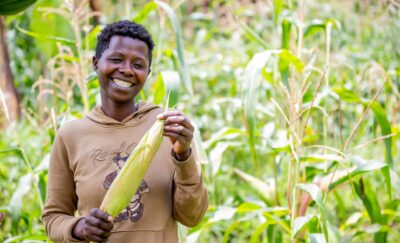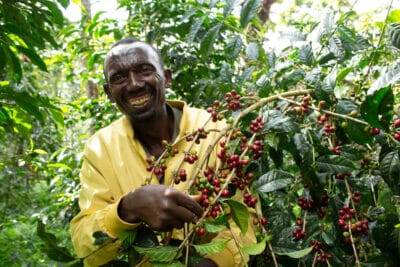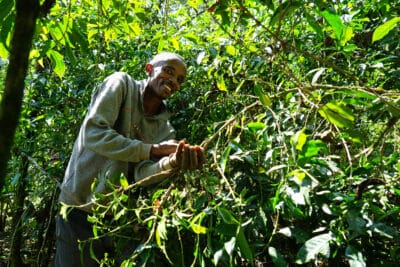Stories
2 June 2025
Fair prices and affordable finance transform the profitability of forest coffee
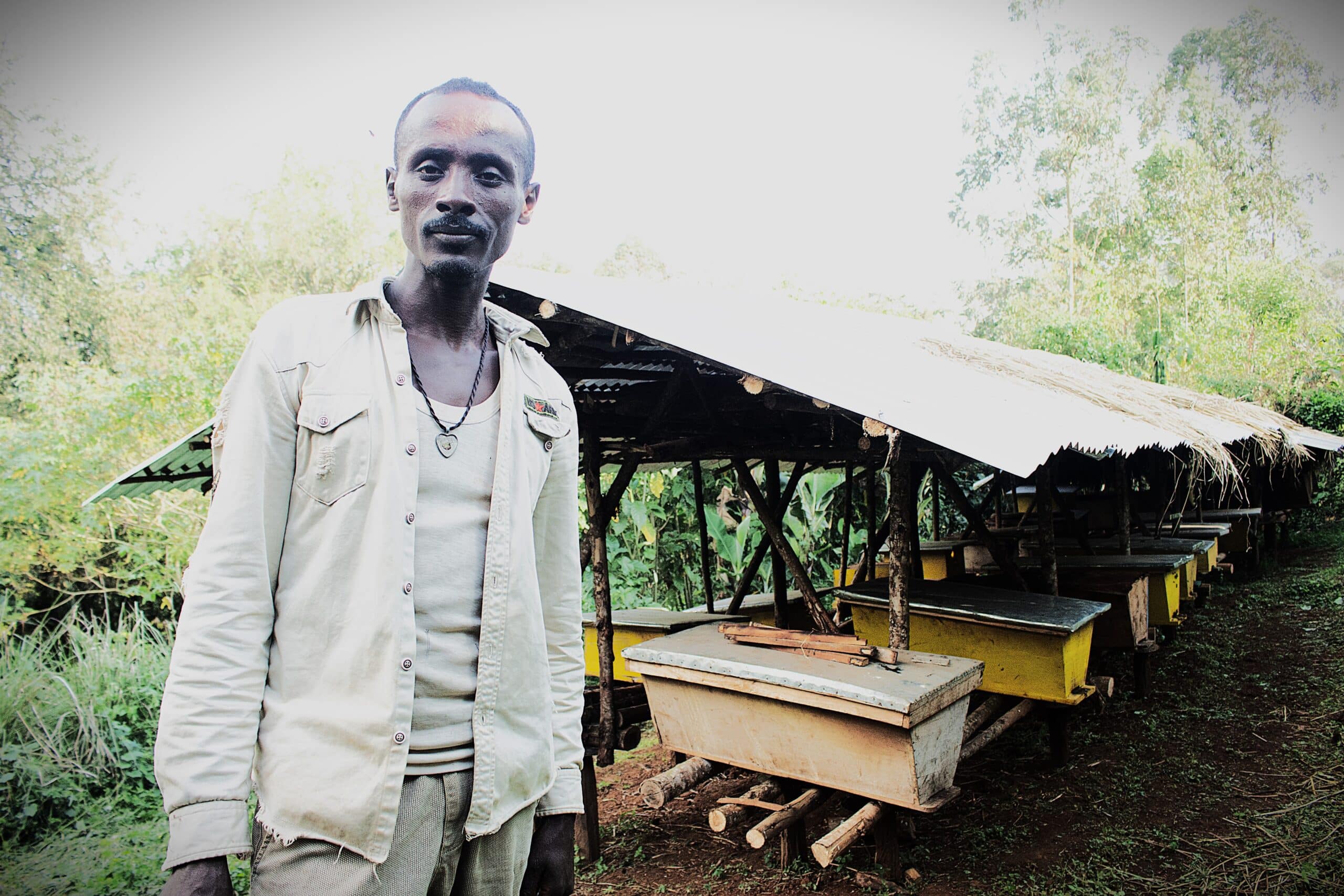
Farm Africa has been working closely with forest coffee farmers in Ethiopia’s Ilu Ababor Zone to unlock the profitability and sustainability of this forest-friendly enterprise.
Twenty-eight year old Fikru Tesfaye from Ilu Ababor Zone of Ethiopia is a small-scale farmer who provides for his family by producing forest coffee, other crops and honey. Like most small-scale farmers, he is dedicated to his work, but, until recently, the returns had been meagre.
Fikru mainly earns income from coffee during the months of November to December, a time of year widely known as a golden period for coffee producers to earn. Like most coffee farmers, Fikru faces significant financial challenges because the harvests from his other crops are not sufficient to sustain his family through the rest of the year.
“Coffee buyers’ deception had been very much painful."
Fikru
Forest coffee farmer
Limited options
The involvement of countless actors in the coffee value chain has aggravated the problem. Local traders and brokers, for example, determine the price of coffee produced by Fikru and other farmers in his village: with the need to put food on the table for their families, coffee farmers have little choice but to sell their coffee at whatever price is offered.
Unscrupulous lenders also exploit their financial vulnerability, lending money on the terms that it be repaid in coffee, not cash, and setting unreasonable terms on collateral, interest rates and mode of payment. The practice can trap coffee farmers in a cycle of poverty, as they find themselves unable to repay the loans charged with excess interest rates.
Fikru was no exception:
“Coffee buyers’ deception had been very much painful. Knowing we have financial shortages, they lend us money on the basis of verbal agreement. The agreement would be for us to deliver the coffee on the agreed repayment date, and for the lenders to take coffee on the then market price. The amount of coffee matches to the amount of loan we take. However, at the time of transactions, buyers would come up with new conditions to help them lower the value of our coffee.”
More profitable prospects
Amid with all these problems, Fikru Tesfaye learned that Aba Gemta Participatory Forest Management Cooperative (PFMC) had been established by Farm Africa to support smallholder farmers like him.
Appreciating the benefits immediately, Fikru did not think twice about joining. Through the PFMC, he received training on quality coffee production and business engagement. As a member of the coop’s coffee producing group, he has been getting multiple benefits including selling his quality coffee to the national market through the PFMC. If he has surplus coffee to sell to local traders, he is no longer a price-taker. His cooperative membership has strengthened his bargaining power and he now plays an active part in deciding his coffee price:
“Only in 2022, I succeeded in producing 340 kg quality coffee which had never happened in my life. Supplying this to my cooperative, I earned 72,000 Birr. The earning from the local market for this amount would have only been 20,000 Birr.”
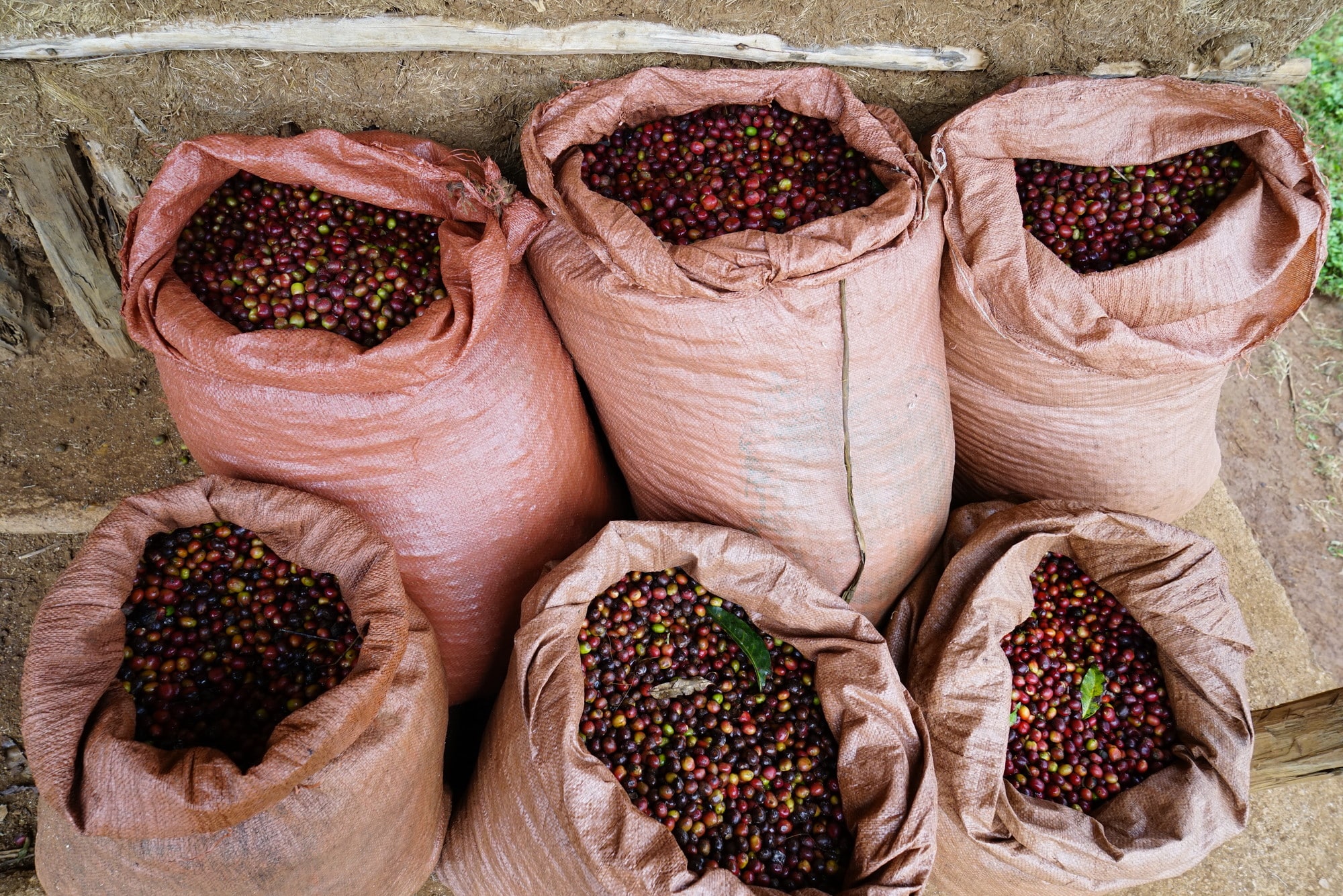
Also, crucially, by joining a village saving and loan association (VSLA) managed by the same cooperative, Fikru is no longer at the mercy of illegal money lenders. As a member, he is only expected to forward his request for a loan. Based on the rules and regulations of the VSLA, he repays back the loan abiding by VSLA rules and regulations. He is no more at the mercy of illegal lenders.
The Farm Africa project also supported him with training and equipment to improve and diversify his income streams. Fikru tells about the support:
“I had little knowledge about improved beehives management, quality coffee production, and livestock management which resulted in less quality and quantity productions. Prior to the project, I had only three beehives. The Farm Africa support has helped me own 15 transitional and 15 modern beehives currently. My annual harvest from the traditional beehives had been only 25-30 kg. Now, having the transitional and modern hives, we transcended production to 120-125 kgs a year.
A better future
Reflecting on the changes Farm Africa’s support has brought to his life, Fikru says:
“I have a lot to provide for my family with now. We have adequate access to food including meat, honey, fruits and vegetables. My family have a TV and a solar panel. We get light in our house which is generated from the panel. We also use solar energy to cook food. This is a big change from using Kuraz light [a small kerosene lamp] and firewood to a modern style of energy usage.”
Learn more about Farm Africa’s work to improve the profitability of forest coffee farming in the ecologically vital Ilu Ababor Zone of Ethiopia:
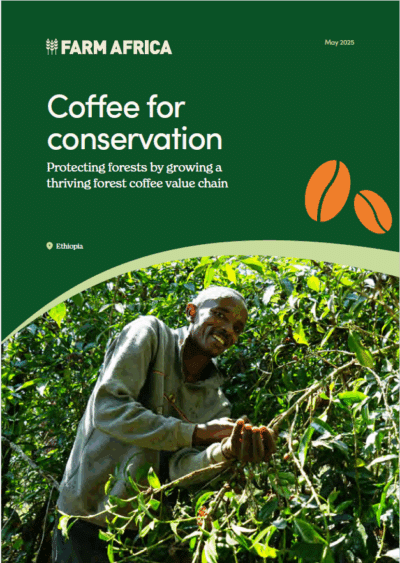
Coffee for conservation: Protecting forests by growing a thriving forest coffee value chain
More info
Country
Ethiopia
Key focus areas
Connect farmers to markets
Increase incomes
Protect ecosystems
Coffee for conservation: Protecting forests by growing a thriving forest coffee value chain
This learning paper describes how a three-year Farm Africa project in the ecologically vital Ilu Ababor Zone of Ethiopia successfully protected natural forests while improving the livelihoods of 4,000 people through sustainable coffee production and alternative income sources.
Download (1.04mb)

Country
Ethiopia
Key focus areas
Connect farmers to markets
Increase incomes
Protect ecosystems
